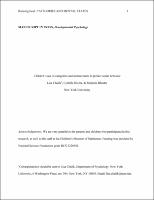Please use this identifier to cite or link to this item:
https://hdl.handle.net/20.500.12202/4427Full metadata record
| DC Field | Value | Language |
|---|---|---|
| dc.contributor.author | Chalik, Lisa | - |
| dc.contributor.author | Rivera, Cyrielle | - |
| dc.contributor.author | Rhodes, Marjorie | - |
| dc.date.accessioned | 2019-06-19T22:52:57Z | - |
| dc.date.available | 2019-06-19T22:52:57Z | - |
| dc.date.issued | 2014-10 | - |
| dc.identifier.citation | Chalik, L., Rivera, C., & Rhodes, M. (2014). Children’s use of categories and mental states to predict social behavior. Developmental Psychology, 50, 2360-2367. | en_US |
| dc.identifier.issn | 0012-1649 | - |
| dc.identifier.uri | http://dx.doi.org/10.1037/a0037729 | en_US |
| dc.identifier.uri | http://dx.doi.org/10.1037/a0037729.supp | en_US |
| dc.identifier.uri | https://hdl.handle.net/20.500.12202/4427 | - |
| dc.description | Scholarly article | en_US |
| dc.description.abstract | Integrating generic information about categories with knowledge of specific individuals is a critical component of successful inductive inferences. The present study tested whether children’s approach to this task systematically shifts as they develop causal understandings of the mechanisms that shape individual action. 3- and 4-year-old children (N = 65) predicted harmful behaviors in scenarios that pitted category-based expectations—that individuals will harm members of opposing social categories—against expectations about agents’ mental states—that individuals will harm people they are mad at. As children developed more advanced theories of mind, they became more likely to predict the agent’s behavior based on individual mental states instead of category memberships. Thus, as children develop causal understandings of the mechanisms that shape individual behavior, they are more likely to override generic category information to base inferences on the relevant features of specific individuals. | en_US |
| dc.description.sponsorship | Acknowledgements. We are very grateful to the parents and children who participated in this research, as well as the staff at the Children’s Museum of Manhattan. Funding was provided by National Science Foundation grant BCS-1226942. | en_US |
| dc.language.iso | en_US | en_US |
| dc.publisher | American Psychological Association | en_US |
| dc.relation.ispartofseries | Developmental Psychology;50(10) | - |
| dc.rights | Attribution-NonCommercial-NoDerivs 3.0 United States | * |
| dc.rights.uri | http://creativecommons.org/licenses/by-nc-nd/3.0/us/ | * |
| dc.subject | Causality | en_US |
| dc.subject | Classification (Cognitive Process) | en_US |
| dc.subject | Social Behavior | en_US |
| dc.subject | Social Cognition | en_US |
| dc.subject | Theory of Mind | en_US |
| dc.subject | Childhood (birth-12 yrs) | en_US |
| dc.subject | Preschool Age (2-5 yrs) | en_US |
| dc.subject | Male | en_US |
| dc.subject | Female | en_US |
| dc.subject | Casual mechanisms | en_US |
| dc.subject | Social categorization | en_US |
| dc.title | Children’s use of categories and mental states to predict social behavior. | en_US |
| dc.title.alternative | "Manuscript in Press" | en_US |
| dc.title.alternative | Categories and mental states | en_US |
| dc.type | Article | en_US |
| dc.contributor.orcid | 0000-0001-9188-1787 | |
| local.yu.facultypage | https://www.yu.edu/faculty/pages/chalik-lisa | |
| Appears in Collections: | Stern College for Women -- Faculty Publications | |
Files in This Item:
| File | Description | Size | Format | |
|---|---|---|---|---|
| Chalik_Rivera_Rhodes.pdf | PDF author | 458.15 kB | Adobe PDF |  View/Open |
This item is licensed under a Creative Commons License

